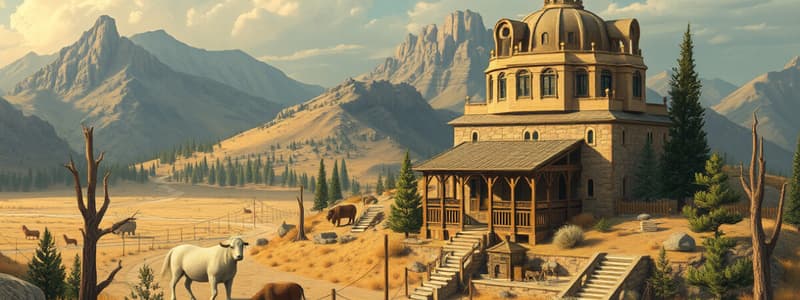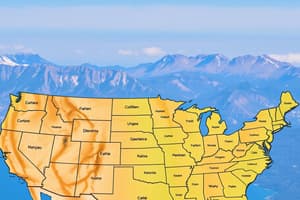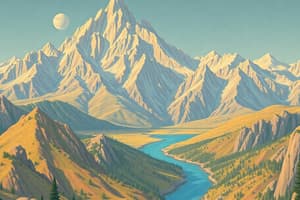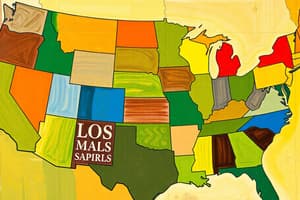Podcast
Questions and Answers
What is the Continental Divide?
What is the Continental Divide?
- The highest point in the Rocky Mountains
- A mountain range in the western United States
- A historical landmark
- The dividing point between rivers flowing east and rivers flowing west (correct)
What are the Great Plains?
What are the Great Plains?
A flat or gently-rolling region in the western United States.
Alaska and Hawaii are contiguous with the continental United States.
Alaska and Hawaii are contiguous with the continental United States.
False (B)
Which bodies of water border the western United States?
Which bodies of water border the western United States?
What are the natural resources of the western United States?
What are the natural resources of the western United States?
Who were the first people to live in the western United States?
Who were the first people to live in the western United States?
Who were the first Europeans to arrive in the western United States?
Who were the first Europeans to arrive in the western United States?
What significant purchase was made in 1803 that expanded the United States?
What significant purchase was made in 1803 that expanded the United States?
What concept did some Americans believe in by the 1830s related to territorial expansion?
What concept did some Americans believe in by the 1830s related to territorial expansion?
What was built in the late 1800s to connect the east and west of the United States?
What was built in the late 1800s to connect the east and west of the United States?
What attracted many people to migrate to parts of the western United States?
What attracted many people to migrate to parts of the western United States?
What agricultural activities took place on the Great Plains?
What agricultural activities took place on the Great Plains?
Native Americans benefited from the arrival of white settlers.
Native Americans benefited from the arrival of white settlers.
What resources were Americans in the west dependent on for their livelihoods?
What resources were Americans in the west dependent on for their livelihoods?
What mode of transportation has cities in the western United States become dependent on?
What mode of transportation has cities in the western United States become dependent on?
Which cities are noted as some of the fastest growing in the interior of the western United States?
Which cities are noted as some of the fastest growing in the interior of the western United States?
What natural resource is increasingly strained due to population growth in western cities?
What natural resource is increasingly strained due to population growth in western cities?
What is NAFTA?
What is NAFTA?
What is agriculture's role in the western United States?
What is agriculture's role in the western United States?
Flashcards are hidden until you start studying
Study Notes
Key Concepts of the Western United States
-
Continental Divide: Marks the boundary for rivers; those flowing east drain into the Atlantic while those flowing west drain into the Pacific.
-
Great Plains: A vast flat area, once dominated by wild grasses; now primarily utilized for farming and ranching.
-
Contiguous States: Alaska and Hawaii are geographically separated from the contiguous 48 states of the U.S. but are still classified as part of the western region.
-
Bordering Bodies of Water: The Pacific Ocean and Gulf of Mexico significantly influence the climate and geography of the area.
-
Natural Resources: Rich in land and energy sources, including petroleum, natural gas, coal, timber, minerals, and renewable energy options like hydroelectric, wind, and solar.
Historical Context
-
Native American Tribes: Initially inhabited the western regions, each contributing unique cultures and practices.
-
Spanish Arrival: The first European explorers to reach the western United States, influencing the region's development.
-
Louisiana Territory Acquisition: In 1803, the U.S. expanded its territory to include land between the Mississippi River and the Rocky Mountains through a purchase from France.
-
Manifest Destiny: A prevalent belief in the 1830s that justified U.S. expansion across North America.
Development and Infrastructure
-
Railroad Construction: Late 1800s saw the establishment of railroads that connected the eastern and western U.S., facilitating commerce and migration.
-
Gold and Silver Discovery: The finding of precious metals drew a significant influx of settlers looking for economic opportunities.
Economic Activities
-
Farming and Ranching: The region transitioned from open grasslands to cultivated farmland and grazing areas for livestock.
-
Impact on Native Americans: Indigenous peoples were displaced as settlers expanded agriculture, leading to reservations for Native American tribes.
-
Lumber Industry: Resources from the region supported industries such as farming, ranching, mining, and fishing, as well as timber harvesting.
-
Automobile Dependence: Cities in the West are often sprawling with limited public transportation systems, increasing reliance on cars.
Urbanization and Resource Management
-
Rapid Urban Growth: Cities like Denver, Phoenix, and Las Vegas are experiencing significant population increases, particularly in the interior.
-
Water Resource Challenges: Growing populations exert pressure on already limited water supplies, essential for sustaining communities and economies.
Trade and Agriculture
-
NAFTA: The North American Free Trade Agreement established in the 1990s fostered trade relations among the U.S., Canada, and Mexico.
-
Agriculture's Importance: A central economic driver in the western U.S., vital for both local communities and national markets.
Studying That Suits You
Use AI to generate personalized quizzes and flashcards to suit your learning preferences.





